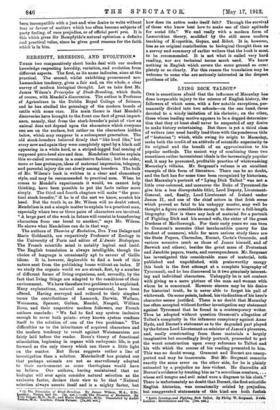HEREDITY, BREEDING, AND EVOLUTION.* These two comparatively short books deal
with our modern knowledge respecting heredity, variation, and evolution from different aspects. The first, as its name indicates, aims at the practical. The second, whilst exhibiting pronounced neo- Lamarckian tendency, gives a fair and, on the whole, a clear survey of modern biological thought. Let us take first Mr.
James Wilson's Principles of Stock-Breeding, which deals, of course, with Menders discoveries. The author is Professor of Agriculture in the Dublin Royal College of Science, and he has studied the genealogy of the modern breeds of cattle with some care. His main theme is that Menders
discoveries have brought to the front one fact of great import- ance, namely, that from the stock-breeder's point of view an animal does not depend upon the characters which everyone can see on the surface, but rather on the characters hidden below, which may reappear in a subsequent generation. The old stock-breeders believed firmly that " like bred like," but every now and again they were completely upset by a black ea 1 f appearing in a white herd, or a striped-legged foal coming of supposed pure-bred sire and dam. Mendelian theories explain this so-called reversion in a conclusive fashion ; but the older, more or less grotesque, ideas of maternal impression, telegony, and parental injury die out slowly among breeders. The bulk of Mr. Wilson's book is written in a clear and elementary style, and may be recommended to practical men. When he comes to Mendel's experiments it would, we cannot help thinking, have been possible to put the facts rather more simply. The third and fourth chapters will make "the prac- tical stock-breeder," if he is of the sort we know, scratch his head. But the truth is, as Mr. Wilson will no doubt retort, Mendelism is not a simple matter to explain to a practical man, especially where two or three pairs of characters are involved. "A large part of the work in future will consist in transferring characters from one breed to another," says Mr. Wilson. He shows what Mendelism can do in that way.
The authors of Theories of Evolution, Drs. Yves Delage and Marie Goldsmith, are respectively Professor of Zoology in the University of Paris and editor of L'Annee Biologigue. The French scientific mind is notably logical and lucid. The English translation is always intelligible, though the choice of language is occasionally apt to savour of Gallic idiom. It is, however, deplorable to find a book of this nature sent from the publishing house without an index. If we study the organic world we are struck, first, by a number of different forms of living organisms, and, secondly, by the fact that living things are adapted to the conditions of their environment. We have therefore two problems to be explained. Many explanations, natural and supernatural, have been offered. Having surveyed and reduced to their simplest terms the contributions of Lamarck, Darwin, Wallace, Weisman, Spencer, Galion, Mendel, Naegeli, William Roux, and their respective modern followers, our French authors conclude : "We fail to find any system inclusive enough to cover both points : every known system confines itself to the solution of one of the two problems." The difficulties as to the inheritance of acquired characters and the modern tendency to revolt against Weismannism are fairly laid before the reader. Roux's theory of functional stimulation, beginning in organs with embryonic life, is put forward as the only theory which can throw a little light on the matter. But Roux suggests rather a line of investigation than a solution. Metchnikoff has pointed out that perhaps animals are not as marvellously adapted to their environment as some theologians would have us believe. Our authors, having maintained that no biologist will ever again consider natural selection as the exclusive factor, declare their view to be that " Natural selection always asserts itself and is a mighty factor, but
• (-1) The Principles of Stock-Breeding. By James Wilson,_ M.A., B.Sc. London Vinton and Co.03. [5s. net.] --(2) The Theories of Evolution. By Yves Dels4c; Sc.D., and Marie oldsmith, M.Sc. Translated by Andre Tridon,M.A. Landon; Frank Palmer. .[7s...,6d, net.]
how does its action make itself felt P Through the survival of those who know best how to make use of their aptitude for social life." We end really with a modern form of Lamarckian theory, modified by the still more modem teaching of Kropotkin, Guyau, and Ribot. It is, however, less as an original contribution to biological thought than akp a survey and summary of earlier writers that the book is most to be recommended. It is not what is called very hard reading, nor are technical terms much used. We know nothing in English which covers the same ground so coin. pletely or so clearly. For this reason the translation may be welcome to some who are seriously interested in the deepest. problems of life.










































 Previous page
Previous page